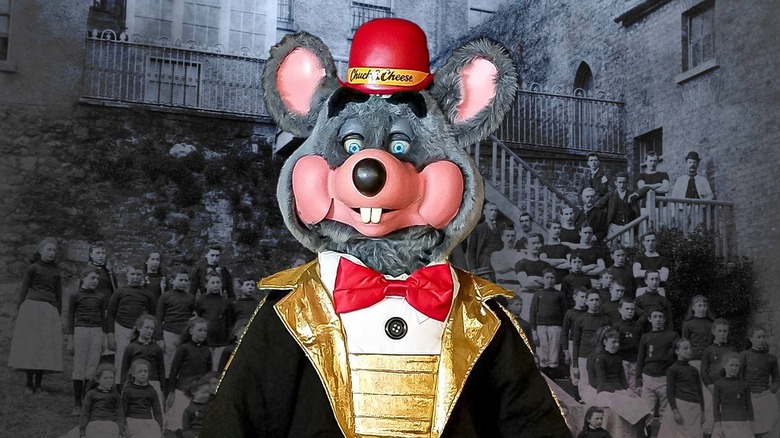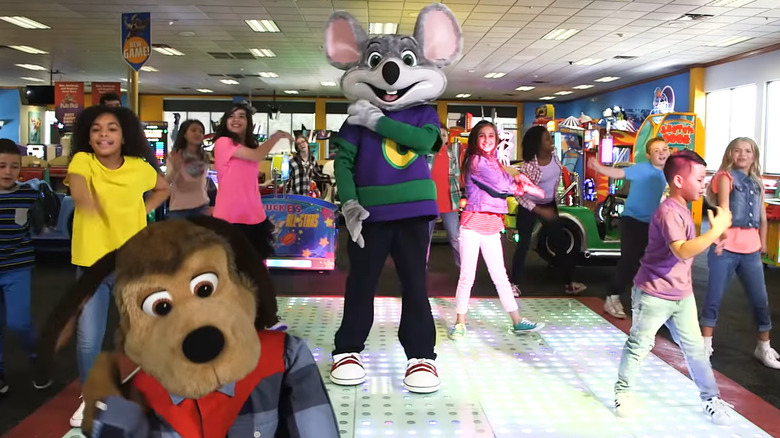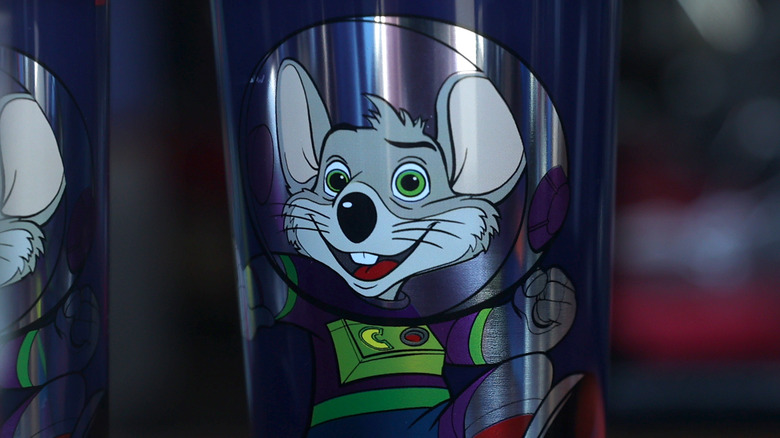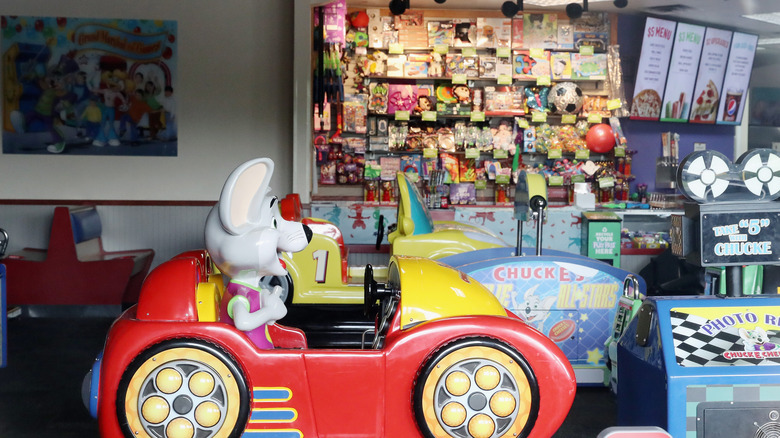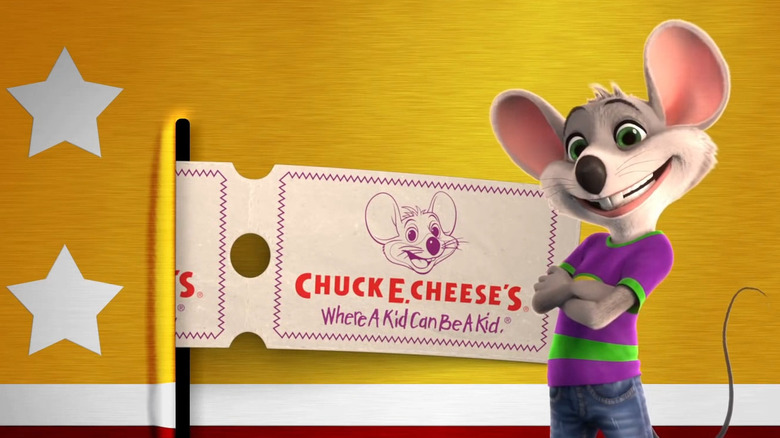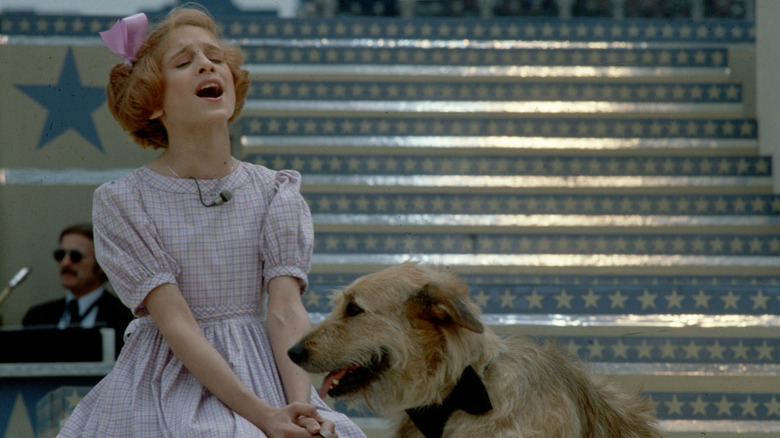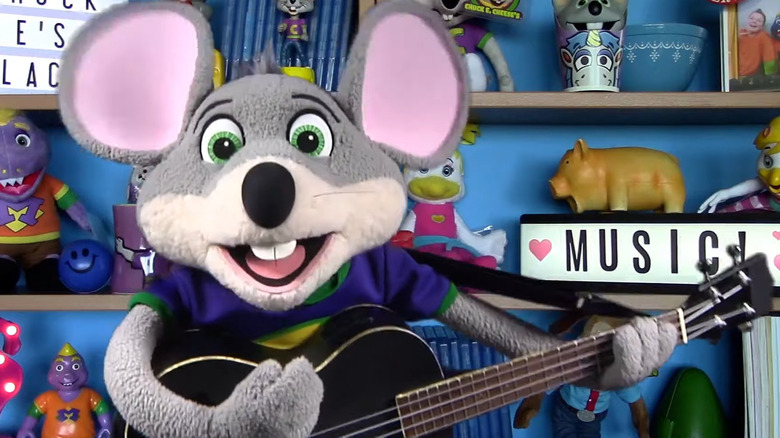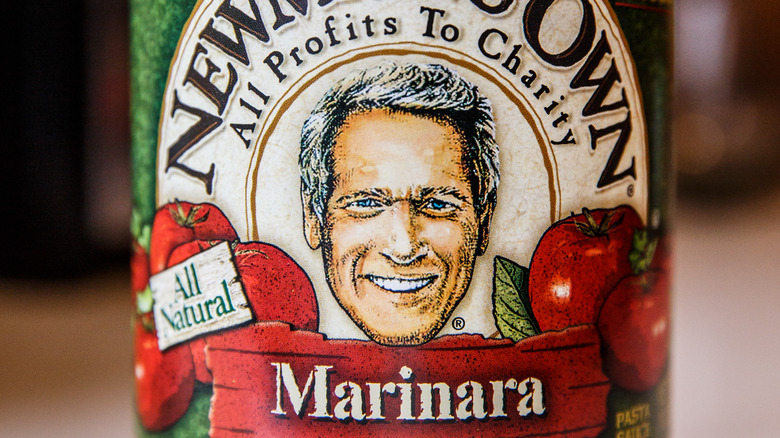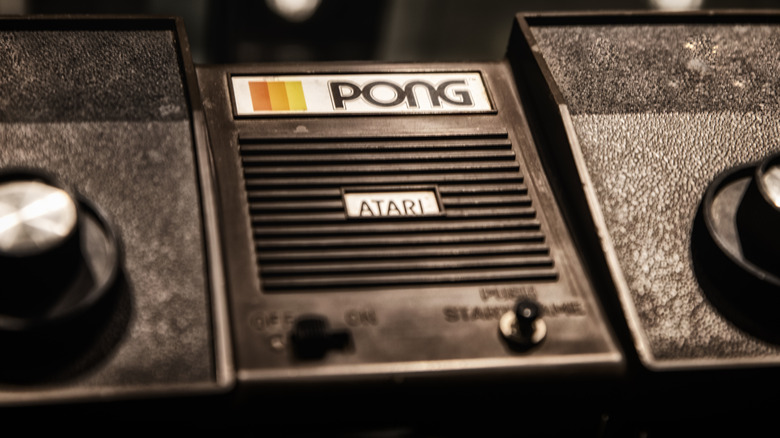What Only Adults Notice About Chuck E. Cheese's Charles Entertainment Cheese III
From a distance, Chuck E. Cheese (birth name Charles Entertainment Cheese III) seems to have it all. The birthday-focused rodent — who's been presented at times as either a rat or a mouse – has built a successful chain of children-centric, arcade-filled pizza restaurants across the U.S. But underneath the surface ... beneath the glitz and glamour displayed by a life in the birthday party fast lane ... there's a darkness lingering in the heart of Charles Entertainment Cheese — the sort only an adult might notice.
Now, our "Behind the Music"-style intro notwithstanding, we're largely joking. For one thing, the namesake of Chuck E. Cheese isn't a real rodent — and thank goodness for that. After all, there's something deeply disturbing about the notion of a humanoid mouse singing "Happy Birthday" to a celebrating kid. But as evidenced by the horrific (and terribly misguided) children's e-book released by Chuck E. Cheese in 2012 revealing its titular mascot's backstory, it's not just the nauseatingly off-putting image of an anthropomorphic rodent that might give adults pause.
Any grown-up reviewing the decades-long existence of Charles Entertainment Cheese III is bound to notice a plethora of details that would fly over the heads of young children. So we decided to highlight the mousy mascot's more notable aspects — from an older person's perspective, that is. Without further ado, here's what only adults notice about Chuck E. Cheese's Charles Entertainment Cheese III.
The notion of an anthropomorphic rodent is disturbing on every level
Before we dive headfirst into the many inferred and discomfiting details found within "The Story of Chuck E. Cheese" e-book, let's first address the rodent in the room. Because while children may be so enthralled by the bright and colorful cacophony inside a Chuck E. Cheese restaurant that they overlook what its mascot actually is, to an adult? There are few sights in the world more unsettling than a gigantic, anthropomorphic rodent — whether rat or mouse.
Now, you might think a clear and reasonable explanation exists as to why a rodent was chosen to be the pizza chain's mascot. Yet Chuck E. Cheese seems to have become a rat solely because of a design error. In fact, while the Chuck E. Cheese mascot was originally conceived as a coyote, but when a rat costume was mistakenly shipped to the restaurant's founders during the development process, they decided to roll with the unexpected — and downright nauseating — rat character concept instead.
Can we take some solace from the fact we weren't subjected to the original name of Rick Rat? Perhaps. But we're still unable to dismiss the unsettling image of a human-sized rodent dancing around — with or without an exaggeratedly buck-toothed smile.
The character's evolution through the years is fairly incomprehensible
Anyone who's paid attention to the corporate evolution of Chuck E. Cheese has likely noticed the parallel path taken by its famous mascot. And just as the company's overall business model has occasionally changed over the years — driven, at times, by a pair of bankruptcy filings — the public presentation of Chuck E. Cheese has transformed as well. After all, when he first appeared in 1977, Chuck E. Cheese was unequivocally presented as a rat — a far cry from the now-named Charles Entertainment Cheese III's gentler, cartoonish appearance as of 2023.
Since one look at the original Chuck E. Cheese reveals a set of indisputably rat-like features, there's no debate regarding the type of rodent the pizza chain's mascot was upon its debut. But seeing how the vast majority of the original mascot's, well, rat-centric features were deliberately softened or removed as the years went on, it's clear that the original presentation didn't fully resonate with customers — making us wonder why the restaurant's founders didn't make more of an effort to stick with a coyote character as originally conceived.
Actually, in that sense, maybe the changes made to the Chuck E. Cheese character are more logical than we realized. But it's also the type of thing only an adult would notice, as few children likely thought twice about the shifting, often-incomprehensible alterations made to the mascot.
His backstory is horrifically depressing
What's the purpose of creating a long, detailed backstory for a fictional mascot? We're not entirely sure ... meaning we have no idea why Chuck E. Cheese executives thought the world was clamoring for further details about the chain's rodent-faced mascot in the early-2010s. Still, if the company was determined to expand the mascot's canon details, that hardly explains why the creative minds responsible for crafting Chuck's story decided he should be an orphaned mouse – one who ostensibly founded the pizza chain because he loves birthday parties since he doesn't know when his own birthday is.
Now, there's a time and a place for everything, and there's nothing wrong, in and of itself, with the idea of a lonely orphan longing to find their place in the world. In fact, something as dark as the death of one's parents can be played for genuine pathos and, occasionally, laughs – at least when it's done right (as this adult orphan writer can attest).
But it's tough to commend or praise the thought process and final decisions made when it comes to the formally-named Charles Entertainment Cheese III's incredibly dark character history. We're not sure how this exact storyline made it to print, but the idea shouldn't have survived a brainstorming session — unlike Charles' deceased parents (hey-o!).
His backstory seems a bit derivative of other rodent-based pop culture characters
Nothing is new, and everything is copied in the modern world. Now, that broadly generalized statement may be overly, well, broad and general, but it does display the difficult path faced by creative folks toward originality. There's a stark difference between drawing inspiration and cutting too close for comfort. While we're hesitant to assign plagiaristic intent to the creators of Chuck E. Cheese's back story, when you consider the similarities between Charles' biography and that of some other popular rodent cartoon characters, it's tough to deny the derivative nature.
The idea of a rat who's desperate to make something of himself in the world, and becomes friends with a chef after sneaking into his kitchen? Doesn't it sound a little like "Ratatouille," my friends? Additionally, we all love the idea of a lost, lonely, song-friendly mouse who longs for his parents and familial companionship — just as we did when Fievel Mousekewitz (Philip Glasser) went through a similar (but far more affecting) struggle in "An American Tail."
Realistically, there's so much wrong in "The Story of Chuck E. Cheese" e-book that the decision to lean on what was already popular for rodent-based stories is one of the least egregious aspects noticeable to adults. But it is, indeed, apparent — so we're obliged to mention it.
The orphanage Charles grew up in sounds far more pleasant than real-life alternatives
Thus far, we've been rather forthright in our assessment of Chuck E. Cheese's backstory, and the numerous mindboggling aspects therein. And while we're not ranking the notable details by ridiculousness, certain story beats are more incomprehensible from an adult's point of view than others. Case in point: depicting the orphanage Charles Entertainment Cheese III grew up in as a joyous, fun-filled place — a stark contrast to most real-life residential facilities for parentless children.
Now, we're not looking to make a public service announcement regarding the dire living situations often found inside orphanage-type facilities in the 21st century. But it's difficult to dismiss the bizarre depiction of Charles' fictional orphanage as akin to a summer camp — or, well, living inside a Chuck E. Cheese restaurant. After all, according to the story, Charles lived a happy life filled with birthday pizza parties, video games, and music lessons — hardly the sort of features found in the real world.
Since the harrowing aspects of real-life residential facilities are likely too bleak for a children's story, the company's choice to minimize those depressing details makes some sense. But that only speaks to the larger issue at hand, one crystal clear to adults: an orphan-centric backstory wasn't the way to go.
The idea that a mouse could create a successful nationwide restaurant chain is ludicrous
Starting your own restaurant can feel like an impossible endeavor in the U.S. After all, nearly 80% of restaurants permanently closed within five years of opening as of 2016, meaning the odds are stacked precipitously against any individual's making that attempt. In that sense, the sheer fact that Chuck E. Cheese has survived nearly a half-century in business is a testament to its success. But seeing how the backstory for the restaurant's mascot indicates Charles himself actually founded the pizza chain, we have to call shenanigans as adults.
Seriously: how in the world could an orphaned mouse successfully conceive and execute an idea for a single restaurant — let alone one that blossomed into a nationwide chain? Just think of the literally countless number of human entrepreneurs who've faced the cold, hard reality of capitalism throughout history. Meanwhile, we're supposed to buy the notion that a rodent could pull it off? Please.
Frankly, there's something ludicrously frustrating about the notion of a rodent finding success in the restaurant industry — be it a mouse or a rat. If the vast majority of human beings can't make a restaurant concept work, there's no reason to believe any non-human would have the capacity, either.
A pizza place run by a rodent wouldn't pass health inspection
While the visible presence of rodent traps in or around a restaurant's building is a red flag to customers, it isn't necessarily an automatic disqualifier; it indicates the business is proactively attempting to rid itself of the problem, after all. But if rodents are present at a restaurant during a health inspection, it clearly won't stay open for long. So any adult is apt to notice Charles Entertainment Cheese III's pizza chain wouldn't have gotten off the ground with a rodent as its purported founder — because what health inspector would have given it a passing grade?
It may actually be somewhat fair to describe rodents' reputation — and rats in particular — as disease-spreading monsters to be a tad overblown. But given the bounty of potential diseases and viruses rodents are indeed known to spread, it's no wonder health inspectors routinely shut down food service establishments where such animals are detected.
Whether or not the notion of rodents as gross and filthy is accurate, one thing's for sure. If a mouse or rat was dancing around a restaurant singing "Happy Birthday" while playing arcade games with children? It would be slapped with numerous violations and closed on the spot — meaning the restaurant would never have become a successful chain with a man (rodent) like Chuck E. Cheese at the helm.
A downtrodden orphan desperate for companionship isn't as endearing as a mouse
The pop culture trope of a plucky, never-say-die orphan eager for love has endured since Little Orphan Annie implored fans to drink their Ovaltine in a crummy commercial. Of course, even a seemingly overused character detail can continue to resonate if it's done properly. Unfortunately, while the writers of "The Story of Chuck E. Cheese" might have believed they were creating the pizza chain mascot equivalent of Punky Brewster by making the rodent an orphan, in reality? The cliché falls flat when it's a two-dimensional cartoon mouse rather than, say, an actual human being.
Perhaps we're being overly harsh here — and are sure PETA would accuse us of bias against non-human animals — but we don't think that's the case. After all, if you're of sound mind and body as an adult, how can you be anything but offended by the pandering attempts to pluck at consumers' heartstrings over a sad sack cartoon mouse?
Now, we can admit the fairly-rushed nature of Charles Entertainment Cheese III's story — the e-book is less than 10 pages long — does it no favors. Then again, as we've mentioned before, that just illustrates the glaring problem with the mascot's officially recognized backstory.
It doesn't make sense that an orphan would be the third of his name
A person's name is everything in life — just ask John Proctor. And while there are no real restrictions on what a person may choose to name themselves or their children, certain aspects of naming simply aren't feasible. For instance, if a boy isn't named after a paternal relative, they wouldn't use a "Jr" or numbered suffix. More to the point, a person who never knew their parents clearly wouldn't be named after their absent father — so why is the Chuck E. Cheese mascot's formal name Charles Entertainment Cheese III?
Seriously: who's supposed to have bestowed the title of third of his name to the rodent? The character was so alone in childhood that he purportedly didn't know when his own birthday was, yet he was around his father long enough to merit a formal, legacy-defining name? We're not buying it.
If nothing else, we suppose the "III" designation is a bit less eye-roll-inducing than if the story had labeled the mascot Charles Entertainment Cheese Jr (since that suffix isn't used after one's father has passed away). But the larger point — that the rodent wouldn't be named for any paternal relatives if he had no idea who his parents were in the first place — remains.
The St. Marinara orphanage isn't named after an actual saint
Since many orphanages are run by charitable organizations affiliated with Christian churches, it's perfectly logical that many of those same residential facilities would be named after important religious figures – namely, one deceased saint or another. Of course, while a kid may gloss over the name of the Chuck E. Cheese mascot's childhood home, an adult may find it impossible to ignore one crucial detail about the fictional Saint Marinara orphanage: it's not named after an actual saint.
As much as we hate to burst the bubble of anyone out there who believed Saint Marinara was an actual historically relevant Christian figure (whose best friend was a revered nun named Sister Salami), the fact is marinara isn't the name of any well-known saints — or even a person at all. Rather, marinara, meaning "seafaring" in Italian, is simply a reference to the famous and popular red sauce commonly served with pasta (or on pizza).
The decision to name a fictional rodent's fictional orphanage after a fictional saint may not be the worst case of false advertising we've come across. But it does present an impossible-to-ignore detail to the adult eye, so we think it's worth mentioning.
He supposedly loves video games, yet his favorite is from 1972
Video games have come a long way since the Atari home console first rocked the world in the 1970s. In that sense, it's difficult to imagine many games from the entertainment niche's nascent days have held up in either popularity or general appeal. So while an adult wouldn't shrug at the notion of an alleged arcade owner loving video games — as is the case with Chuck E. Cheese's mascot character — they would cry foul at the notion of a 21st-century video game enthusiast whose favorite game is Pong.
We're not trying to exhibit recency bias, but it's implausible that anyone following the trajectory of video games would continue to pledge loyalty to a game developed in 1972. Then again, perhaps Chuck E. Cheese (the company) was less interested in verisimilitude in this instance than providing a winking nod to the restaurant's founder, Nolan Bushnell — the man who invented Pong. And there is some legitimacy to the notion that Pong remains a simple, enjoyable game in the 2020s.
But when you consider the staggering improvements made in graphics and gameplay capabilities over the years, it's incomprehensible to an adult that someone (or some rodent) who loves video games would declare Pong as their favorite — regardless of any logical underlying explanations.
